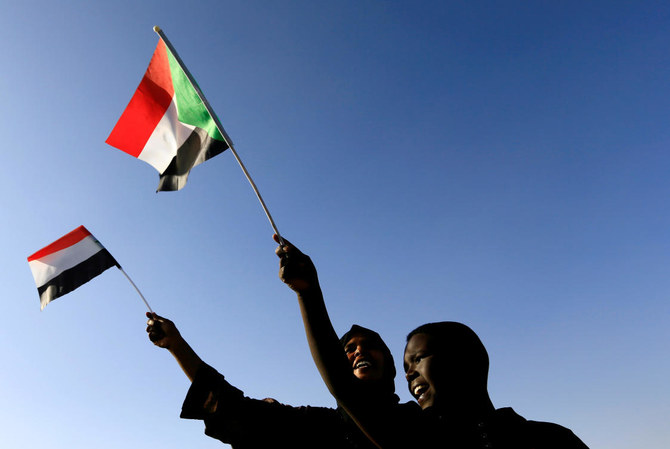KHARTOUM: Sudan said Sunday it had opened an investigation into crimes committed in the Darfur region by members of the regime of ousted president Omar Al-Bashir.
Prosecutor general Tagelsir Al-Heber said "we started an investigation about the crimes that have been committed in Darfur from 2003", speaking on his arrival in Khartoum from a visit to the United Arab Emirates.
The investigation - the first launched since Bashir was ousted by the army in April amid mass protests after 30 years in power - focuses on "cases against former regime leaders", Heber said without giving names.
Bashir himself, who is behind bars for corruption and awaiting trial on other charges, is wanted by the International Criminal Court in The Hague for his role in the bloody conflict.
The ICC issued warrants for Bashir's arrest in 2009 and 2010 on charges of genocide, war crimes and crimes against humanity in the conflict that left around 300,000 people dead and 2.5 million displaced, according to the United Nations.
The Darfur fighting broke out in 2003 when ethnic minority rebels took up arms against Bashir's Arab-dominated government, which they accused of marginalising the region.
Human rights groups say Khartoum targeted suspected pro-rebel ethnic groups with a scorched earth policy, raping, killing, looting and burning villages.
Despite numerous calls for his extradition, the ex-dictator has not been sent to The Hague, the seat of the ICC.
Brought to power by a 1989 coup, Bashir was deposed on April 11 by the army, after months of a mass protest movement against his regime that left dozens dead.
Following a deal reached in August between the military and protesters, Sudan is now led by a transitional government tasked with paving the way for civilian rule.
The investigation was announced on Sunday as the new government has vowed to establish peace in the country's conflict-hit regions, including Darfur.
On December 14, Bashir was sentenced by a court in Khartoum to two years' detention in a correctional centre for corruption in the first of several cases against him.
Bashir is also being investigated for his role in the 1989 coup that brought him to power.
On Sunday, Heber also said that proceedings had been launched against Salah Gosh, former intelligence chief under Bashir.
"There four cases against Salah Gosh and we started a procedure to bring him (back to Sudan) by Interpol."
Gosh, head of the feared National Intelligence and Security Service (NISS), resigned in April two days after the ouster of Bashir, and is now outside of Sudan.
Sudan opens Darfur crimes probe against Bashir regime figures
https://arab.news/2zd4q
Sudan opens Darfur crimes probe against Bashir regime figures

- The investigation focuses on "cases against former regime leaders"
- Darfur fighting broke out in 2003 when ethnic minority rebels took up arms against Bashir
Family of Palestinian-American shot dead by Israeli settler demand accountability

- Relatives say Abu Siyam was among about 30 residents from the village of Mukhmas who confronted armed settlers attempting to steal goats from the community
LONDON: The family of a 19-year-old Palestinian-American man reportedly shot dead by an Israeli settler in the occupied West Bank have demanded accountability, amid mounting scrutiny over a surge in settler violence and a lack of prosecutions.
Nasrallah Abu Siyam, a US citizen born in Philadelphia, was killed near the city of Ramallah on Wednesday, becoming at least the sixth American citizen to die in incidents involving Israeli settlers or soldiers in the territory in the past two years.
Relatives say Abu Siyam was among about 30 residents from the village of Mukhmas who confronted armed settlers attempting to steal goats from the community. Witnesses said that stones were thrown by both sides before settlers opened fire, wounding at least three villagers.
Abu Siyam was struck and later died of his injuries.
Abdulhamid Siyam, the victim’s cousin, said the killing reflected a wider pattern of impunity.
“A young man of 19 shot and killed in cold blood, and no responsibility,” he told the BBC. “Impunity completely.”
The US State Department said that it was aware of the death of a US citizen and was “carefully monitoring the situation,” while the Trump administration said that it stood ready to provide consular assistance.
The Israeli embassy in Washington said the incident was under review and that an operational inquiry “must be completed as soon as possible.”
A spokesperson for the Israeli Defense Forces said troops were deployed to the scene and used “riot dispersal means to restore order,” adding that no IDF gunfire was reported.
The military confirmed that the incident remained under review and said that a continued presence would be maintained in the area to prevent further unrest.
Palestinians and human rights organizations say such reviews rarely lead to criminal accountability, arguing that Israeli authorities routinely fail to prosecute settlers accused of violence.
A US embassy spokesperson later said that Washington “condemns this violence,” as international concern continues to grow over conditions in the occupied West Bank.
Palestinians and human rights groups say Israeli authorities routinely fail to investigate or prosecute settlers accused of violence against civilians.
Those concerns were echoed this week by the UN, which warned that Israel’s actions in the occupied West Bank may amount to ethnic cleansing.
A UN human rights office report on Thursday said that Israeli settlement expansion, settler attacks and military operations have increasingly displaced Palestinian communities, with dozens of villages reportedly emptied since the start of the Gaza war.
The report also criticized Israeli military tactics in the northern West Bank, saying that they resembled warfare and led to mass displacement, while noting abuses by Palestinian security forces, including the use of unnecessary lethal force and the intimidation of critics.
Neither Israel’s foreign ministry nor the Palestinian Authority has commented on the findings.














